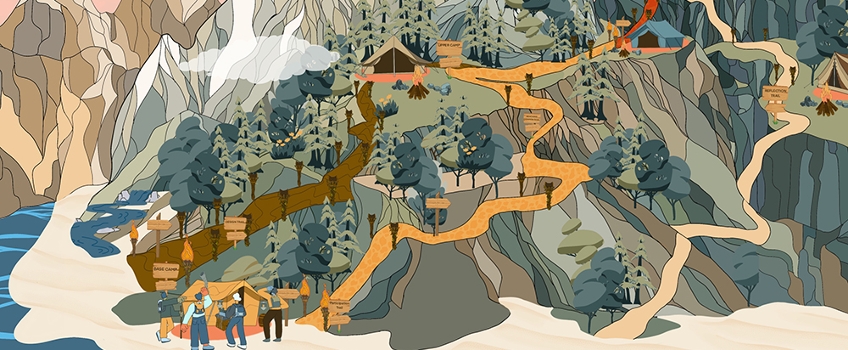A sustainable future for oneself and for each other. How can higher education contribute to this? We believe that transdisciplinary education is essential for training agile and resilient professionals who continue to evolve.
Through our research, we support and develop this type of education. The name of our research group is Transdisciplinary Cooperation in Education. We investigate various dimensions of transdisciplinary collaboration.
Definition Transdisciplinary Education
Transdisciplinary education focuses on societal or sustainability challenges. For instance, mental well-being, robust democracy, youth crime, or healthy urban growth. These ‘grand challenges’ are so intricate that they necessitate an approach where various stakeholders pool their knowledge and skills.
Grand challenges
Transdisciplinary education commences with a problem that demands an innovative, integrated, and holistic approach. We collaborate; transdisciplinary learning thrives only in partnership with others. This places strong emphasis on group composition, equitable collaboration, and the significance of interaction.
Within our research group, we explore how individuals learn and work together in a transdisciplinary setting. We investigate how collective knowledge is generated and contributes to problem-solving. Based on our research, we’re developing a dynamic tool—the Trail Tool—to assist in creating, implementing, and executing transdisciplinary education. Our research aims to foster evidence-informed transdisciplinary environments.
Laboratories
There is a clear trend of experimenting spaces with appealing names such as living labs, interstitial spaces, or HELIO (Hybrid External Learning and Innovation Environment). We are investigating the effectiveness of these real-world laboratories. Additionally, we explore strategies to enhance the success of these experimental spaces. Our findings are disseminated through scientific publications, workshops, tools, or an online magazine.
Different perspectives
Numerous stakeholders are involved in grand challenges and transdisciplinary collaboration. This results in diverse perspectives on the problems, leading to a variety of solutions. All these different disciplines and viewpoints necessitate extra attention to the way we collaborate or co-create.
However, this holistic approach to work can also be quite challenging. Within our research group, we aim to support transdisciplinary environments by examining the essential factors and dynamics that contribute to effective collaboration. Additionally, we explore which supporting tools, such as the Trail Tool, are most effective in this context.
Drivers
Transdisciplinary collaboration brings together various stakeholders in education. These include students, faculty members, and researchers. Additionally, individuals from small and medium-sized enterprises (SMEs), municipalities, energy companies, and experts with lived experience are also part of this collaborative effort. Each party brings their unique perspective, interests, and needs.
We believe there is a compelling reason to delve deeper into significant issues. People want to contribute and participate in finding solutions. Therefore, engagement is crucial, as are ethical considerations. This is evident in the various names sometimes used for transdisciplinary education, such as Community Engaged Learning, Civic Learning, or Challenge-Based Learning.
Different stakeholders
The research group collaborates with students ranging from vocational education to university level, along with faculty members, researchers, advisors, and external professionals. Our research spans Avans University of Applied Sciences, consortia, and international partnerships. Societal and sustainability challenges transcend borders. Together with higher education institutions across Europe, we explore transdisciplinary and international collaborations.
Life is beautiful. And it’s our responsibility to ensure that it remains beautiful and becomes even more so for everyone. Higher education plays a crucial role in this endeavor. Simultaneously, we inhabit a fractured world. Through our research, we aim to contribute to preserving and healing life’s beauty. One of the ways we achieve this is by creating evidence-informed transdisciplinary environments. We aspire to showcase remarkable examples.
Are you enthusiastic? Would you like to participate or learn more? Feel free to reach out to us.

